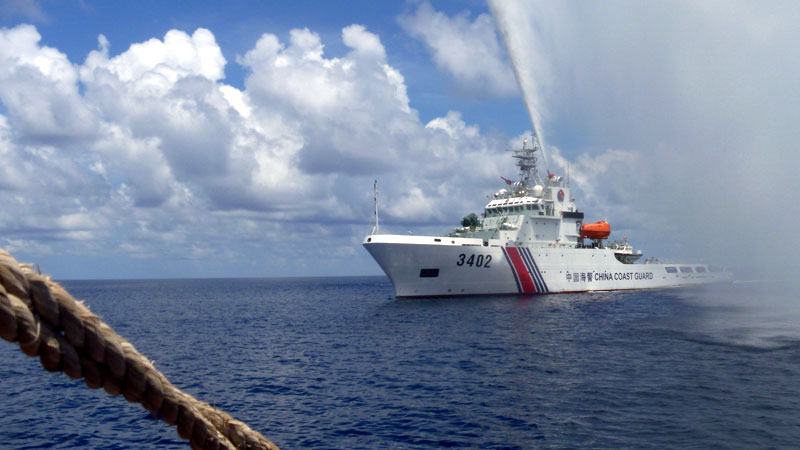Beijing: So what if we lose in UN?

A CHINESE Coast Guard ship approaches Filipino fishermen off Panatag Shoal in the West Philippine Sea in this photo dated Sept. 23, 2015, which was provided by one of the fishermen, Renato Etac. AP
CHINA has said it expects a United Nations arbitration court to rule in favor of the Philippines in the dispute over territory in the South China Sea, but the decision will not change anything, as Beijing will not abide by it.
In a statement to US reporters posted on the Chinese foreign ministry’s website, Chinese Vice Foreign Minister Liu Zhenmin said the case filed by the Philippines in 2013 “was not to settle any specific disputes, but to ask the arbitral tribunal to judge on questions about the interpretation and application of the Convention (on the Law of the Sea).”
“China does not accept or participate in the arbitration, and the arbitral tribunal has lent a ready ear only to the Philippines. I think the award will probably be in the Philippines’ favor,” Liu told the US journalists who traveled to Beijing on May 19.
Incoming Foreign Secretary Perfecto Yasay Jr. on Friday said the Philippines would seek help from “friends and allies” to persuade China to get to the negotiating table to implement the decision of the UN Permanent Court of Arbitration.
“Even if we get a favorable judgment, or decision, from the arbitration court, there might be some questions of enforcement or implementation of this decision because the court does not have any enforcement capability,” Yasay said.
Ruling coming soon
The arbitration court in The Hague is expected to hand down a ruling in the coming weeks, and China has embarked on a series of high-level meetings with its security allies to win support for its position not to recognize the court’s decision.
The Philippines has asked the UN tribunal to invalidate China’s claim to almost all of the South China Sea, and declare that its right to exploit resources in waters within its exclusive economic zone should be respected.
Liu reiterated that China would not implement the award, and declared that the ruling would not change anything.
“There is no agency entitled to act as the international police and award depends on countries for recognition and implementation. This is the essence of international law, which needs the respect from sovereign nations,” Liu said.
He also raised suspicion at the United States’ strong support for the Philippines’ arbitration case when it did not stand to benefit from it.
“We don’t understand why the US has been so active in backing the arbitration behind the scene. As time goes by, I believe the plot will eventually come to light. In sum, the arbitration initiated by the Philippines is dishonest and not based on goodwill. China will not accept or participate in it, let alone to recognize the so-called award,” Liu said.
He said that once the arbitration court handed down its decision, “we can expect propaganda by countries like the Philippines and the US about the award having binding power for China.”
Liu stressed that China would make clear its position of not recognizing or accepting the award and would justify why the award has no binding power.
Bilateral talks
But he said China would “stay committed to settling the South China Sea disputes with the Philippines through negotiation and consultation.”
“We hope the next Philippine administration will adopt new thinking on the issue,” he added.
President-elect Rodrigo Duterte has said he is open to bilateral talks with China to solve the territorial dispute.
But he has also said that the Philippines will never surrender its right over Panatag Shoal, a rich fishing ground off the coast of Zambales province that China seized in 2012 after a two-month standoff with the Philippine Navy.
It was the loss of Panatag Shoal, internationally known as Scarborough Shoal, that compelled the Philippines to submit its territorial dispute with China to the UN tribunal for resolution.
Malacañang on Sunday said that more countries were supporting the Philippine case.
Speaking on state-run radio, Presidential Communications Secretary Herminio Coloma Jr. said the petition brought by the Philippines was in keeping with the United Nations Convention on the Law of Sea, which the Philippines and 165 other nations had ratified.
“The step taken by the Philippines continues to gather support from different countries,” Coloma said.
No arbitration
At the Shangri-La Dialogue security conference in Singapore on Saturday, Rear Adm. Guan Youfei, director of the foreign affairs office of China’s national defense ministry, said China considered the Philippine case illegal, as “the territorial and sovereignty disputes have not been subjected to arbitration.”
China has refused to recognize the UN court and stayed away from the proceedings in The Hague.
The United States and other Western countries have said China should respect the court’s ruling and stop its land reclamation in the South China Sea to reduce tensions in the region.
Coloma said the Philippines would continue to keep its commitment to its allies to help keep peace and stability in the Asia-Pacific region.
“We affirm our shared commitment with the rest of the Association of Southeast Asian Nations and the United States that regional stability rests upon a foundation of international law, rules and norms, and that there is need to respect the rights of all nations regardless of size,” he said.